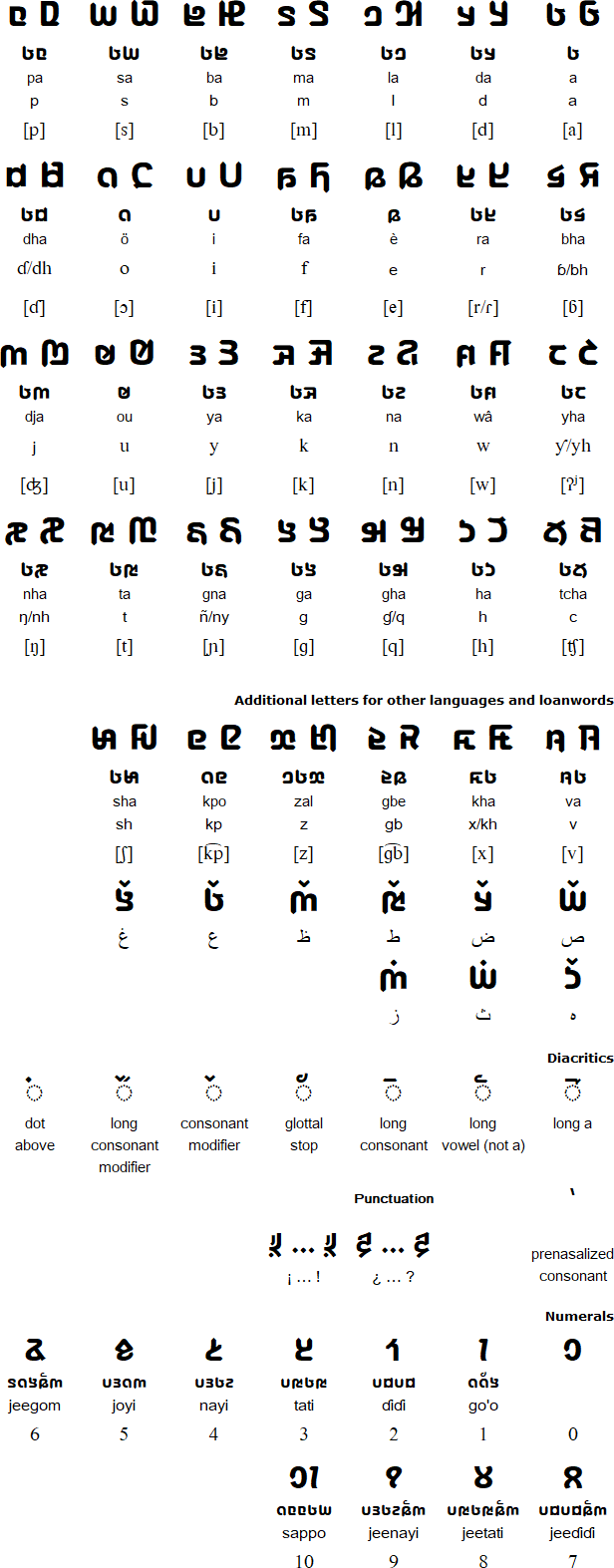The ADLaM alphabet was devised in the 1990 by Ibrahima and Abdoulaye Barry, two brothers from Guinea who decided that their language, Fulani, needed its own alphabet. At the time Ibrahima was 14 and Abdoulaye was 10. It took them six months to created the alphabet. The name of the alphabet comes from the first four letters, A, D, L, and M, and is also an abbreviation of Alkule Dandayɗe Leñol Mulugol ("the alphabet that protects the peoples from vanishing").
The brothers produced a number of handwritten books in their alphabet and taught their family to read and write it. Then they taught the women and children in their village. The alphabet became more and more popular and the brothers set up learning centres in Togo, Senegal, Benin, and even in New York.
When a way of printing the alphabet was developed, a newspaper and books were published. However the government of Guinea were opposed to the alphabet, and Ibrahima Barry was sent to prison for three months in 2007. After being released he and his brother emigrated to the USA to study in Portland, Oregon. In 2012 a font for ADLaM was created, and ADLaM was added to Unicode in 2016.
Fula (Fulfulde), a Senegambian language spoken by 13 million people in many parts of in West, Central and North Africa.

Download an ADLaM alphabet chart (Excel)
Hear the ADLaM letters pronounced
Some information about the ADLaM alphabet supplied by Michael Peter Füstumum

Innama aadeeji fof poti, ndimɗidi e jibinannde to bannge hakkeeji. Eɓe ngoodi miijo e hakkilantaagal ete eɓe poti huufo ndirde e nder ɓ iynguyummaagu.
All human beings are born free and equal in dignity and rights. They are endowed with reason and conscience and should act towards one another in a spirit of brotherhood.
(Article 1 of the Universal Declaration of Human Rights)
Information about Fula | Phrases | Numbers | Tower of Babel | Adamaua Fulfulde | ADLaM alphabet
Information about ADLaM
http://www.windenjangen.org/home
https://en.wikipedia.org/wiki/Fula_alphabets
http://www.unicode.org/L2/L2014/14219r-n4628-adlam.pdf
http://std.dkuug.dk/JTC1/SC2/WG2/docs/n4488.pdf
http://scriptsource.org/cms/scripts/page.php?item_id=script_detail&key=Adlm
http://skyknowledge.com/adlam.htm
https://unlocked.microsoft.com/adlam-can-an-alphabet-save-a-culture/
https://books.google.co.uk/
ADLaM fonts
http://www.windenjangen.org/download_keyboard
http://unifoundry.com/unifont.html
Adamaua Fulfulde, Bassari, Fula(ni), Ménik, Serer, Wolof
A-chik Tokbirim, Adinkra, ADLaM, Armenian, Avestan, Avoiuli, Bactrian, Bassa (Vah), Beitha Kukju, Beria (Zaghawa), Borama / Gadabuursi, Carian, Carpathian Basin Rovas, Chinuk pipa, Chisoi, Coorgi-Cox, Coptic, Cyrillic, Dalecarlian runes, Elbasan, Etruscan, Faliscan, Fox, Galik, Georgian (Asomtavruli), Georgian (Nuskhuri), Georgian (Mkhedruli), Glagolitic, Global Alphabet, Gothic, Greek, Hurûf-ı munfasıla, Irish (Uncial), Kaddare, Kayah Li, Khatt-i-Badíʼ, Khazarian Rovas, Koch, Korean, Latin, Lepontic, Luo Lakeside Script, Lycian, Lydian, Manchu, Mandaic, Mandombe, Marsiliana, Medefaidrin, Messapic, Mongolian, Mro, Mundari Bani, Nag Chiki, Naasioi Otomaung, N'Ko, North Picene, Novo Tupi, Nyiakeng Puachue Hmong, Odùduwà, Ogham, Old Church Slavonic, Oirat Clear Script, Ol Chiki (Ol Cemet' / Santali), Old Italic, Old Nubian, Old Permic, Ol Onal, Orkhon, Osage, Oscan, Osmanya (Somali), Pau Cin Hau, Phrygian, Pollard script, Runic, Székely-Hungarian Rovás (Hungarian Runes), South Picene, Sutton SignWriting, Sunuwar, Tai Viet, Tangsa, Todhri, Toto, Umbrian, (Old) Uyghur, Wancho, Yezidi, Zoulai
Page last modified: 20.11.23
[top]
You can support this site by Buying Me A Coffee, and if you like what you see on this page, you can use the buttons below to share it with people you know.

If you like this site and find it useful, you can support it by making a donation via PayPal or Patreon, or by contributing in other ways. Omniglot is how I make my living.
Note: all links on this site to Amazon.com, Amazon.co.uk
and Amazon.fr
are affiliate links. This means I earn a commission if you click on any of them and buy something. So by clicking on these links you can help to support this site.
[top]